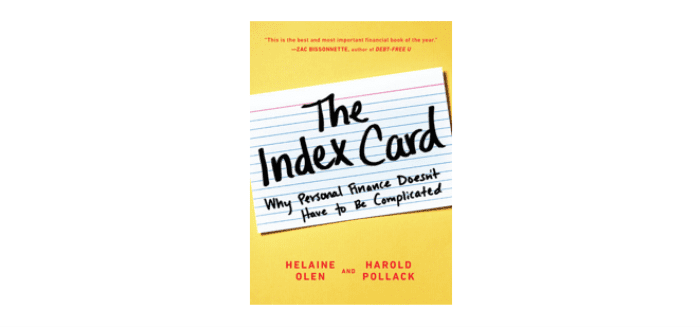I’m not sure what they teach in other countries, but I managed to get through more than twenty years of school without developing any substantive understanding of personal finance. Given my work in financial stewardship, I’m also certain that my experience is far from unusual. I’m not so sure churches should necessarily become hubs of personal finance advice, but we could certainly move the needle a little, couldn’t we? Below, I highlight one book that might do just that, and it’s so simple it fits on an index card.
Yours truly,
Adam Copeland, Center for Stewardship Leaders
The Index Card: Personal Finance for Generous Living
A few years ago, a scholar at the University of Chicago made a surprising claim: all the best personal finance and investment advice can be boiled down so simply that it fits on a single index card. When asked to prove it, he got an index card from his daughter’s stash, and wrote down nine rules. Indeed, they did fit just fine. He posted the card to his blog and it went viral.
This semester at the seminary, I’ve hosted a discussion group on the book that eventually bloomed out of that first index card story. Written by Harold Pollack, that University of Chicago professor, and Helaine Olen, The Index Card: Why Personal Finance Doesn’t Have to be Complicated would serve as a great Christmas present for anyone in your network who could benefit from straightforward, simple financial education.
Both our students and staff at Luther have found the book and discussion hugely beneficial. It’s amazing, considering how much money-related concerns affect our lives, how little most of us talk about them with one another. This semester’s book discussion has given us the opportunity to share our joys, challenges, and laments about personal finance. Staff have shared from their experiences, some of them heart-wrenching, so that students might make different choices down the road. Students have shared their questions because, really, how many places can you actually discuss appropriate savings rates and whether — and what sort — of life insurance to buy?
Perhaps my favorite part of The Index Card is the concept itself. Personal finance raises anxiety levels for so many of us, and the personal finance industry often doesn’t help that much. In fact, I sometimes wonder if part of the industry’s goal is to overly complicate finances so that people feel they don’t know the answers, and then pay others for advice.
Now, don’t get me wrong, there are great people who work in the financial advice industry and there are certainly many complicated questions that must be puzzled out with professionals, but the system still reminds me of Paul’s use of the “powers and principalities” (Ephesians 6:12). For Paul, these powers seem to be about all that work against God and God’s will for us. They are the systems, the dehumanizing complexities, the bureaucracies, the “that’s-just-how-it-is” attitudes that seek to trick us into inaction. Or, perhaps, the act of just putting a blanket over our head in despair.
The gift of The Index Card, however, is that it offers a simple way to push back against those powers. Pollack and Olen suggest that through education, we no longer have to feel trapped or anxiously uncertain when it comes to personal finance. Their book, though secular, also offers several points easily reframed in Christian language. For example, one of the concluding chapters argues for the support of the social safety net. Neighbors helping neighbors.
I recently gave a talk on generosity at a congregational forum. When it came time for questions, a gentleman referenced the airline safety phrase, “put your oxygen mask on first before helping others.” He asked if I might comment as to whether, with all my talk of generosity, I might be missing the self-preservation angle. I thanked him for the question, and found myself responding by referencing The Index Card and its advice on striving to save 10-20% of one’s income. The book frames such savings not just for personal gain, but to give individuals the freedom to live with less financial anxiety, avoiding the downhill spiral that can occur when unexpected expenses occur — the vehicle repair, the broken refrigerator, even the loss of a job.
I hadn’t quite thought of it this way before, but in some ways, having an emergency savings account might free people to be more generous. Just like the oxygen mask, our care for others is wrapped-up in how we attend to our own welfare. In any case, I commend the book for use by anyone searching for financial advice. I’ve also found it to work great in a book group format. Plus, it’s fairly narrow, and might even fit in a Christmas stocking!
More Information
Adam J. Copeland is the Director of Stewardship Leaders at Luther Seminary.
Purchase The Index Card by Harold Pollack and Helaine Olen (New York: Portfolio/Penguin, 2016) here.
Executive Certificate in Religious Fundraising: Luther Seminary, in partnership with the Lake Institute on Faith and Giving, is hosting a four-day intensive course, May 7-10, 2018. For more information visit: Lake Institute

